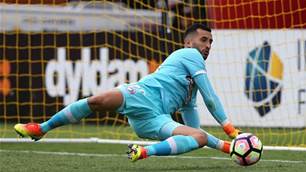THE UNPRECEDENTED growth of Western Sydney Wanderers poses major challenges for police and stadium security according to a UK crowd management expert.
Professor Clifford Stott has warned against heavy-handed policing following the explosion in support for the A-League club during its first season.
Stott described Wanderers' rapid rise as a "phenomenon" in world football and said there were salutary lessons to be learned from Europe’s chequered experience with football crowds.
The Liverpool fan, who has written extensively on football violence and policing, said the value of those lessons became evident during the recent A-League grand final.
Thousands of ticket-holders were caught in a crush outside Allianz Stadium prior to kick off following the arrival of a much larger than anticipated pre-match march.
The incident attracted widespread criticism, with security accused of being over-zealous in the search for flares, causing inordinate delays and putting public safety at peril.
But Stott, who visited Australia soon after and spoke face-to-face with the chief of NSW Police Riot and Public Order Squad, said authorities appeared to adapt appropriately to the “spontaneous crowd” by abandoning plans for more rigorous security checks.
“You don’t want to go down the road of a crackdown – because crackdowns can themselves actually create the problems that everyone is seeking to avoid,” Stott said.
“The march is a really good example of that. Had there been an attempt to impose a strict regime what we could have seen in the very problem everyone feared. In this case not so much disorder as crushing.
“If we look at Hillsborough for example that’s exactly what happened. It was an over-emphasis on crowd control that created an environment that was fatally unsafe for football fans.”
Stott’s studies on crowd behaviour have revolutionised the management of football crowds in Europe and played a key role in reducing the scourge of English hooliganism.
And despite lurid media reports condemning behaviour by some Wanderers fans – including a much-publicised confrontation with outdoor diners – Stott said Australia did not have a significant problem.
“When you look at the condemnatory headlines, one thing that seems clear to me is that they don’t reflect what’s actually going on in terms of the level, or extent or the scale of the problem,” he said.
“That isn’t really a serious problem that you’ve got there.
“But it could become one if you went down the route of a crackdown because football fans in this group appear to be pushing in the direction of a form of fandom which we refer to as ultra-culture. They like the displays, the vibrancy and atmosphere; it’s part of their identity.
“And if there is a crackdown on the expression of that identity it could lead to quite serious consequences in terms of creating situations where those groups come into conflict with authorities.
“If they feel that their rights of legitimate expression are being contravened that feeds into a perception among these groups that conflict with the authorities is justifiable because they don’t see it as violence and hooliganism they see it as a reassertion of rights.”
Stott’s studies into the 1990 (Italy) and 1998 (France) World Cup finals exposed the failures of riot policing which fed a cycle of conflict and escalation. Collaboration with Portuguese police ahead of Euro 2004 resulted in a steep decline in disorder incidents.
In the UK, the introduction of uniformed “police spotters” has been a positive step forward, whereby officers – akin to a neighbourhood bobby - attend home and away matches and are well known within the fan base.
“Many people feel that when you’ve got potentially violent fans the way to deal with that is through enforcement and deterrents – that you gear up the police to come down on trouble and troublemakers,” Stott explained.
“But what we find in our work is that effective crowd management policies are much more sophisticated than that. They revolve around dialogue and communication, building relationships with fans and that includes those who are problematic.
“It’s not so much the control of disorderly behaviour but the facilitation of orderly behaviour.”
The new approach has been hugely successful in reforming the image and behaviour of UK fans abroad which reached its nadir in the late 90s, typified by events at the 1998 World Cup in France when English supporters clashed with locals in Marseille, leading to widespread arrests.
While banning hooligans from travelling overseas is often credited with the change, Stott has a different view. Assurances that troublemakers won’t be attending England games, he says, results in host police forces recalibrating their response to visiting supporters – and that makes all the difference.
“It’s that process of toning down the police response which has been central and integral to why the violence doesn’t happen anymore,” he said.
“What was happening is that host police forces were expecting English fans to be a marauding bunch of hooligans and they would wheel out the riot squad to protect their towns from these invaders from the north and that in turn would create practices that would exacerbate tensions and lead to escalations in violence.”
After watching the development of Australian football from afar, Stott says he’s excited by what he sees.
“I think it’s going from strength to strength,” he said. “To see the rise of the Wanderers – I think all of these things speak volumes about how engaged the Australian people are becoming with soccer. And I think it bodes for a very positive future.”
Related Articles

Socceroo-in-waiting seals Championship deal

Fringe Socceroo swerves A-League to remain in Europe after Fulham exit













